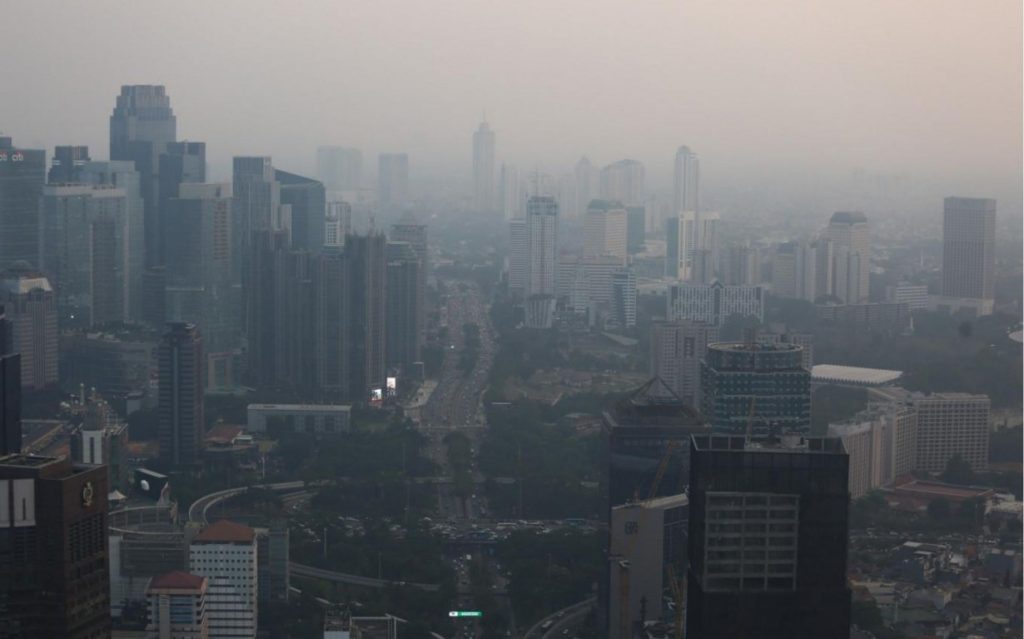
Research shows that Jakarta’s air quality is so bad that it’s cutting 2.3 years off the average resident’s lifespan
Jakarta – Indonesia’s capital city – is the world’s second-most populous urban area. Home to around 10 million people, Jakarta is already under serious environmental threats.
Environmental issues in Jakarta are associated with the city’s high population density and rapid industrialization, and they are often given a lower priority due to high poverty levels, and under-resourced governance.
AIR POLLUTION
Jakarta’s air has been heavily polluted for years. The city’s poor air quality is the result of many factors but mainly it’s due to numerous nearby coal-fired power plants, transport emissions, manufacturing, household emissions, construction, road dust, and open waste burning.
Jakarta traffic (BEAWIHARTA)
- In 2017, the US Embassy’s air monitoring stations recorded just 26 days where the air quality was classified as “good”.
- In the first half of 2019, just 10 days of healthy air was recorded.
- Greenpeace Indonesia estimates that at least 7,390 Jakartans die every year due to high levels of PM2.5 (particulate matter (PM) having a diameter <2.5mm) and almost 2,000 babies born with low birth weights for the same reason.
- Out of 44 sub-districts in Jakarta, 16 lists “upper respiratory infections” as the top cause of illness.
- Seven existing coal-fired power plants and five planned power plants, all within 100km of Jakarta will be equal to adding 10 million cars to Indonesia’s already-jammed roads.
RIVER POLLUTION
Sadly, Jakarta is also famous for having many polluted rivers, one of which is the Citarum River which is dubbed as the world’s most polluted river according to the ‘World Bank’.
Citarum River (AFP/BBC)
- A study found that if the weight of plastic waste from all the rivers in Jakarta combined, the total would come to 2.1 million kilograms, which is equivalent to 1,000 Tesla Model S cars!
- At five locations of the Ciliwung river in May 2018, a study found that 20,000 items flow into the ocean per hour.
- The National Development Planning Board (Bappenas) reported in February 2018 that 96% of river water in the city is severely polluted.
- Out of 13 rivers running through Jakarta, only Krukut River’s water is clean enough to be treated for potable water.
THE SINKING OF JAKARTA
Jakarta sits on a swampy land with 13 rivers that flow through the city. Being an extremely low lying city with average elevation no more than 8m above sea level, Jakarta is rapidly sinking.
Jakarta has sunk by 4 m in the last 30 years and it is estimated that 95% of north Jakarta will be underwater by 2050.
North Jakarta is under greater threat as it has sunk by 2.5m in the last 10 years alone. That’s twice the global average for coastal megacities. This situation could directly impact 1.8 million of the 10 million people living in the city.
The contributing factors to this peril are excessive depletion of groundwater reserves, rising sea levels, and volatile weather patterns driven by climate change.
WASTE PROBLEMS
The polluted river could have been avoided if Jakarta had a better waste management system which the city lacks. For instance,
- Jakarta produces more than 7,000 tons of trash per day that end up in the landfill.
- Most of the landfills operate as an open dump: The waste is piled high, with little control over any resultant environmental problems, such as groundwater pollution and the release of methane gas
- The Rate of plastic recycled was identified as 24%, leaving 76% of plastic waste in the landfills or the environment.
- Indonesia is the world’s second-largest food waster, binning almost 300 Kg of food per person each year.
Literal Mountain of trash at Bantargebang landfill in Jakarta (Adam Dean / The New York Times)
INITIATIVE BY THE ADMINISTRATION
With the abundance of problems that Jakarta is facing, the administration has taken many efforts. To name a few,
- President Jokowi officially established an extensive rehabilitation campaign nicknamed Citarum Harum involving, among others, the central government, local administrations, the Indonesian Military (TNI), and the police. In 2017, he has also declared seven years as the target for restoring the Citarum River.
- Jakarta Administration gave an interesting solution for air pollution in the city which is to use weather modifying technology to induce man-made rain.
- Indonesia has set an ambitious target with a policy decision called National Strategic Policy for waste management. The target is to manage 100% of their waste by 2025; 30% by reduction and 70% by processing (recycling and recovery).
- In July 2020, Jakarta officially banned the use of single-use plastic bags at shopping malls and markets.
INITIATIVE BY COMMUNITY
- In 2019, a group of citizens sued the Indonesian government, including the president, over the poor air quality in Jakarta, which at that time was ranked as the worst in the world.
- Greeneration Foundation together with Waste4Change (Indonesian based organization) and RiverRecycle (Finnish cleantech start-up) are undergoing a pilot project to reduce waste in Citarum River, Indonesia.
- Bantar Gebang Biji or BGBJ is a volunteer-run NGO that accommodates classes for 30 to 70 children from the local community around the Bantargebang Landfill to raise awareness among the children about the massive scale of Indonesia’s waste problem and encourages them to do their part to address the issue.
BGBJ Students and Volunteers (Brilio/Resa Boenard)
THE NEED FOR CIRCULAR ECONOMY
A circular economy is an alternative to a traditional linear economy (make, use, dispose) in which we keep resources in use for as long as possible, extract the maximum value from them whilst in use, then recover and regenerate products and materials at the end of each service life.
Circular Economy vs Linear Economy (PTT ExpressSo)
CIRCULAR ECONOMY BASED SOLUTIONS
Air Pollution Circular Economy Solutions
- Invest in more bicycle lanes
- Promote transport sharing models in a smaller locality that can be scaled to the whole city in the form of car sharing.
- Improve the sustainability factors of public transport such as replacing old diesel engines to minimize emissions.
- Expanding the number of open green spaces.
River Pollution Circular Economy Solutions
- Optimize water use
- Have an awareness program for the community – especially for the informal settlements communities along the rivers
- Citizen science for the community to help track the pollution
- Increase literacy rate for communities
Waste Problem Circular Economy Solutions
- Increasing recycling rates by training citizens
- Improving waste collection rates
- conducting separation at source
- Integrating scavenger activity with a waste bank and municipality collection
- Providing a material recovery facility at final disposal sites using sorting technology to recover plastics.
EARTH5R CIRCULAR ECONOMY INITIATIVES
One of the many programs of Earth5R that aims to help a community become more sustainable is installing organic waste composting units in buildings in Mumbai, India.
One such building – Sunglory at Powai, Mumbai – with its 80 families is proud to be a ZERO WASTE building. Residents of Sunglory building segregate their waste and their organic waste is processed inside the building premises.
The compost that is produced can be used for the gardens, sold, or used for plantation programs.
The residents of Sunglory Building posing in front of the composting units (Earth5R)
This is an example of a circular economy as it brought social, environmental, and economic impacts.
- Social: People segregate waste and are more aware of sustainable living
- Economic: Cutting cost of unsegregated waste treatment and livelihood opportunity
- Environmental: Reduce the amount of waste that is going to the landfill
Much like Mumbai, Jakarta is also a bustling city which can adapt these practices and other circular economy models to create a more sustainable future.
Reach out to Earth5R to know more about solving environmental issues by creating circular economy based sustainability projects.
ABOUT EARTH5R
Earth5R is an environmental organization from India with its head office at Mumbai. It works with the NGO sector, Companies and helps them conduct environmental corporate social responsibility (CSR) programs across India. Earth5R specializes in circular economy based projects. Earth5R also offers short term and long term environmental courses.
Earth5R’s Global Sustainability Hub is a cross-sector and cross-country collaboration in pursuit of UN Sustainable Development Goals. It is an excellent opportunity for governments and the private sector to engage with communities, use Sustainability-based models to drive economic changes, and create social and environmental impact.
Reported by Shafa Azzahra, edited by Riya Dani



